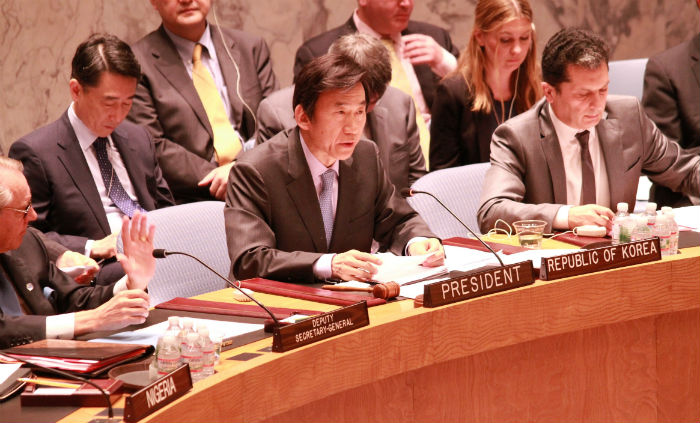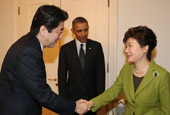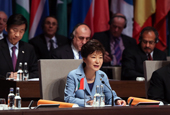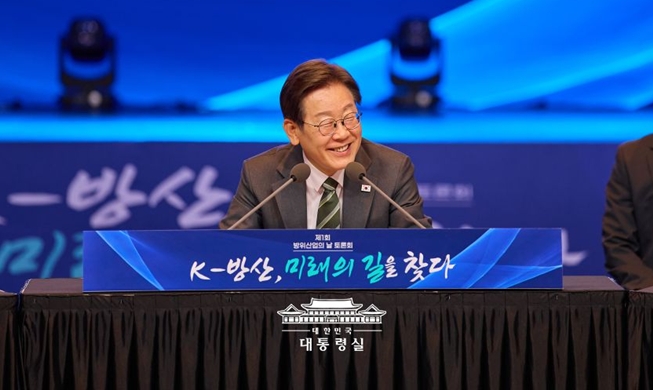The United Nation Security Council hosted an open debate on May 7 in commemoration of the 10th anniversary of U.N. Security Council Resolution 1540, adopted in 2004 and aimed at preventing the proliferation of weapons of mass destruction (WMDs). "Commemorating the 10th Anniversary of Resolution 1540 and Looking Ahead" wrapped up with the adoption of a U.N. presidential statement.
As Korea holds the council's rotating presidency for the month of May, Foreign Minister Yun Byung-se made the lead statement. He noted that the adoption of Resolution 1540 marked a key milestone in response to new threats of proliferation of WMDs in the 21st century. Calling upon all member nations to step up their efforts in this regard, Minister Yun stressed that there were three essential tasks needed to underpin all such future endeavors.

Minister Yun also emphasized that North Korea's nuclear weapons program constitutes the weakest link in nuclear non-proliferation, nuclear security and the safety of the world, and also poses an obvious threat to international peace and security. In light of this, he added, further nuclear tests by North Korea must be prevented through the concerted efforts of the international community. He warned that the international community would see some of the most serious consequences if North Korea were to challenge the U.N. with another nuclear test.
Security Council member states reaffirmed during the debate that the proliferation of WMDs poses a threat to international peace and security. They adopted a presidential statement that calls for more efforts in fully implementing Resolution 1540 by the year 2021.
The statement sets forth the following tasks: develop strategies that would lead toward the full implementation of Resolution 1540; enhance assistance to developing countries in implementing the resolution; attain the committee's objective of achieving universal reporting; and, promote synergies between Resolution 1540 and other non-proliferation related initiatives.
The meeting brought together the U.N.'s Deputy Secretary-General Jan Eliasson and delegates from 15 other member states, along with 40 non-member states of the U.N. Security Council. The delegates welcomed and expressed support for the adoption of the presidential statement and spoke about ways to promote the implementation of Resolution 1540 and to further develop the international non-proliferation framework.
By Lee Seung-ah
Korea.net Staff Writer
slee27@korea.kr
As Korea holds the council's rotating presidency for the month of May, Foreign Minister Yun Byung-se made the lead statement. He noted that the adoption of Resolution 1540 marked a key milestone in response to new threats of proliferation of WMDs in the 21st century. Calling upon all member nations to step up their efforts in this regard, Minister Yun stressed that there were three essential tasks needed to underpin all such future endeavors.

Foreign Minister Yun Byung-se (center) stresses that more efforts must be made to prevent the proliferation of WMDs, during a U.N. Security Council debate held in commemoration of the 10th anniversary of the adoption of Resolution 1540. (photo courtesy of the Ministry of Foreign Affairs)
Minister Yun also emphasized that North Korea's nuclear weapons program constitutes the weakest link in nuclear non-proliferation, nuclear security and the safety of the world, and also poses an obvious threat to international peace and security. In light of this, he added, further nuclear tests by North Korea must be prevented through the concerted efforts of the international community. He warned that the international community would see some of the most serious consequences if North Korea were to challenge the U.N. with another nuclear test.
Security Council member states reaffirmed during the debate that the proliferation of WMDs poses a threat to international peace and security. They adopted a presidential statement that calls for more efforts in fully implementing Resolution 1540 by the year 2021.
The statement sets forth the following tasks: develop strategies that would lead toward the full implementation of Resolution 1540; enhance assistance to developing countries in implementing the resolution; attain the committee's objective of achieving universal reporting; and, promote synergies between Resolution 1540 and other non-proliferation related initiatives.
The meeting brought together the U.N.'s Deputy Secretary-General Jan Eliasson and delegates from 15 other member states, along with 40 non-member states of the U.N. Security Council. The delegates welcomed and expressed support for the adoption of the presidential statement and spoke about ways to promote the implementation of Resolution 1540 and to further develop the international non-proliferation framework.
By Lee Seung-ah
Korea.net Staff Writer
slee27@korea.kr
Statement By Minister Yun Byung-se of the Ministry of Foreign Affairs
Deputy Secretary General Eliasson,
Excellencies,
Distinguished Representatives,
Ten years ago, the adoption of resolution 1540 by the Security Council marked a key milestone in our efforts to address the challenge arising from the nexus between proliferation of weapons of mass destruction (WMD) and terrorism.
As a binding international norm under Chapter VII of the UN Charter, resolution 1540 complements the existing non-proliferation regime that had formerly been focused on states. The resolution reflects a fundamental shift in our paradigm regarding the international community’s response to the threat of WMD proliferation.
Over the past ten years, resolution 1540 has mobilized significant efforts across the globe to combat new WMD proliferation threats. The number of States that implemented legislative measures to prohibit the proliferation activities of non-state actors has more than doubled during this period. At the same time, law enforcement and export control capabilities of these States have improved steadfastly in recent years. Despite past achievements, daunting challenges still lie ahead in an increasingly complex operational environment given the rapid advances in science and technology. This is why, on the 10th anniversary of this landmark resolution, we should step up efforts to achieve its full and universal implementation. The Presidential Statement (PRST) that we have just adopted sets an important goal of achieving full implementation of resolution 1540 by 2021, and maps out key areas that we should work on to achieve this goal. Building on the progress of the past decade, the 1540 Committee will report a comprehensive roadmap and strategy to the Security Council by 2016.
In this regard, I would like to stress, in particular, three essential tasks that should underpin our future efforts.
First, the 1540 Committee’s crucial role in monitoring the implementation of the resolution should be further enhanced.
To date, 172 out of 193 Member States have presented their implementation reports. Considering the voluntary nature of the reporting, this is a remarkable achievement. In marking the 10th anniversary of the resolution, efforts should be redoubled to achieve the goal of universal reporting by Member States. Second, we cannot overstate the importance of capacity building and assistance for the implementation of resolution 1540.
As the saying goes, “a chain is only as strong as its weakest link.” However robust the security networks may be in many countries, it takes vulnerability and failing in just one country to spell insecurity for all. We should continue to strengthen the matchmaking role of the 1540 Committee to facilitate the provision of effective and tailored assistance to states. In addition to the efforts by the Security Council, we need to expand cooperation among all stakeholders, including relevant international and regional organizations. For its part, the Republic of Korea launched the International Nuclear Non-proliferation and Security Academy (INSA), which will contribute actively to the capacity-building efforts in the region. We will also contribute one million US dollars to support the activities of the 1540 Committee.
Third, we should promote synergy between resolution 1540 and other non-proliferation related norms and initiatives.
Resolution 1540 imposes an extensive set of obligations that cut across a broad range of WMD proliferation aspects, encompassing nuclear, chemical and biological weapons and their means of delivery, as well as their related materials and technologies.
In today’s security environment where non-state actors can easily have access to WMD-related materials and technology, non-proliferation and WMD security are indivisibly linked. The Hague Nuclear Security Summit held last March reinforced this important point, as more than 30 states announced the “Joint Statement on Full and Universal Implementation of Resolution 1540.” Such coordination efforts should be expanded to other areas of WMD control.
Excellencies,
Distinguished Representatives,
Today, the weakest link in nuclear non- proliferation, along with nuclear security and safety, is exposed by North Korea’s nuclear weapons programs.
The DPRK is the only country in the world that has conducted nuclear tests in the 21st century. Notwithstanding the efforts of the international community, North Korea has continued to develop its nuclear weapons over the last two decades, and is now threatening its fourth nuclear test.
If North Korea succeeds in acquiring nuclear weapons, it will seriously undermine the NPT regime and will exacerbate tension and instability in Northeast Asia.
Further nuclear tests by North Korea must be prevented through concerted efforts of the international community. If we fail to effectively act upon such a clear and present threat to international peace and security, it will critically weaken the credibility of the Security Council as well as the integrity of the UN Charter which demands that all Members be peace-loving states.
We must clearly warn North Korea that if it challenges the international community with another nuclear test, it will be met with the most serious consequences.
Excellencies,
Distinguished Representatives,
Having the honor of presiding over the Security Council today, I am pleased that we were able to adopt this significant Presidential Statement. As the Chair of the 1540 Committee, the Republic of Korea will continue to lead efforts to realize full and universal implementation of the resolution over the course of our remaining term.
I look forward to your constructive contributions on the development and future direction of resolution 1540 during today’s open debate.
Thank you.
Most popular
- Grammy-winning producer calls Suga of BTS 'amazing artist'
- Animated 'KPop Demon Hunters' tops Netflix charts in 41 markets
- 'Squid Game' events to pump up K-Content Seoul Travel Week
- Reunited BLACKPINK releases video preview of world tour
- 'Universal love, family' themes fuel success of 'King of Kings': director



